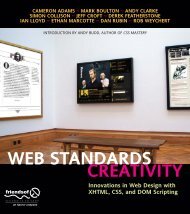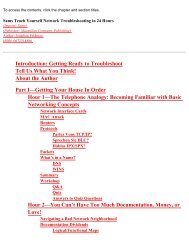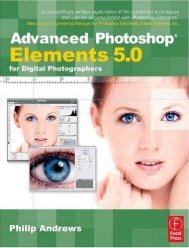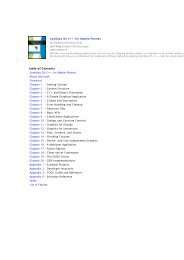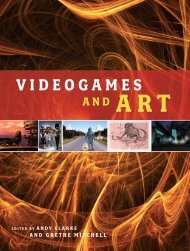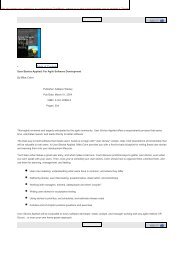- Page 2 and 3:
Advances in Universal Web Design an
- Page 4 and 5:
Advances in Universal Web Design an
- Page 6 and 7:
Section.V:.Accommodating.Disabiliti
- Page 8 and 9:
The book puts the emphasis on the u
- Page 10 and 11:
from the commercial and cultural fi
- Page 12 and 13:
Acknowledgments We would like to wa
- Page 14 and 15:
Web Access b l ty and the Needs of
- Page 16 and 17:
Web Access b l ty and the Needs of
- Page 18 and 19:
Web Access b l ty and the Needs of
- Page 20 and 21:
Web Access b l ty and the Needs of
- Page 22 and 23:
Web Access b l ty and the Needs of
- Page 24 and 25:
Web Access b l ty and the Needs of
- Page 26 and 27:
Web Access b l ty and the Needs of
- Page 28 and 29:
Web Access b l ty and the Needs of
- Page 30 and 31:
Web Access b l ty and the Needs of
- Page 32 and 33:
Web Access b l ty and the Needs of
- Page 34 and 35:
Web Access b l ty and the Needs of
- Page 36 and 37:
Web Access b l ty and the Needs of
- Page 38 and 39:
Chapter II Failing the Disabled Com
- Page 40 and 41:
Failing the Disabled Community 27 L
- Page 42 and 43:
Failing the Disabled Community 29 a
- Page 44 and 45:
Failing the Disabled Community 31 X
- Page 46 and 47:
Failing the Disabled Community 33 W
- Page 48 and 49:
Table 1. continued Issue WC AG Text
- Page 50 and 51:
Failing the Disabled Community 37 L
- Page 52 and 53:
Failing the Disabled Community 39 H
- Page 54 and 55:
Failing the Disabled Community 41 I
- Page 56 and 57:
Chapter III Designing Children’s
- Page 58 and 59:
Figure 1. Grace’s story Designing
- Page 60 and 61:
Designing Children’s Multimedia 4
- Page 62 and 63:
Sara Bridget: Do you use the comput
- Page 64 and 65:
Designing Children’s Multimedia 5
- Page 66 and 67:
Designing Children’s Multimedia 5
- Page 68 and 69:
Figure 3. Trouble on the Island by
- Page 70 and 71:
Figure 4. The Kitten Family and Cat
- Page 72 and 73:
Designing Children’s Multimedia 5
- Page 74 and 75:
Designing Children’s Multimedia 6
- Page 76 and 77:
Designing Children’s Multimedia 6
- Page 78 and 79:
Designing Children’s Multimedia 6
- Page 80 and 81:
Curriculum-Focused Design Designing
- Page 82 and 83:
Designing Children’s Multimedia 6
- Page 84 and 85:
Designing Children’s Multimedia 7
- Page 86 and 87:
Chapter.IV Bonded.Design: A.Methodo
- Page 88 and 89:
Bonded Des gn Contextual design cal
- Page 90 and 91:
Figure 1. Model of bonded design DE
- Page 92 and 93:
Table 1. Timetable for History Trek
- Page 94 and 95:
Group.Discussion Bonded Des gn A fr
- Page 96 and 97:
Bonded Des gn Figure 3. Portal prot
- Page 98 and 99:
Bonded Des gn Figure 7. Retrieval d
- Page 100 and 101:
Bonded Des gn Figure 9. HTML mock-u
- Page 102 and 103:
Bonded Des gn Bonded.Design.from. t
- Page 104 and 105:
Bonded Des gn Figure 14. Results di
- Page 106 and 107:
Bonded Des gn from the topics menu,
- Page 108 and 109:
Bonded Des gn Proceedings of the Ca
- Page 110 and 111:
Age ng and ts Impl cat ons for Elde
- Page 112 and 113:
Age ng and ts Impl cat ons for Elde
- Page 114 and 115:
Age ng and ts Impl cat ons for Elde
- Page 116 and 117:
Age ng and ts Impl cat ons for Elde
- Page 118 and 119:
Age ng and ts Impl cat ons for Elde
- Page 120 and 121:
Age ng and ts Impl cat ons for Elde
- Page 122 and 123:
Age ng and ts Impl cat ons for Elde
- Page 124 and 125:
Age ng and ts Impl cat ons for Elde
- Page 126 and 127:
Age ng and ts Impl cat ons for Elde
- Page 128 and 129:
Age ng and ts Impl cat ons for Elde
- Page 130 and 131:
Gender Issues in HCI Design for Web
- Page 132 and 133:
Gender Issues in HCI Design for Web
- Page 134 and 135:
Gender Issues in HCI Design for Web
- Page 136 and 137:
Gender Issues in HCI Design for Web
- Page 138 and 139:
Gender Issues in HCI Design for Web
- Page 140 and 141:
Gender Issues in HCI Design for Web
- Page 142 and 143:
Cognition Layer Gender Issues in HC
- Page 144 and 145:
Gender Issues in HCI Design for Web
- Page 146 and 147:
Gender Issues in HCI Design for Web
- Page 148 and 149:
Gender Issues in HCI Design for Web
- Page 150 and 151:
Action Man: http://www.actionman.co
- Page 152 and 153:
Gender Issues in HCI Design for Web
- Page 154 and 155:
Gender Issues in HCI Design for Web
- Page 156 and 157:
Gender Issues in HCI Design for Web
- Page 158 and 159:
(e.g., Web logs). Gender Issues in
- Page 160 and 161:
Gender Issues in HCI Design for Web
- Page 162 and 163:
Gender Issues in HCI Design for Web
- Page 164 and 165:
Gender Issues in HCI Design for Web
- Page 166 and 167:
Gender Issues in HCI Design for Web
- Page 168 and 169:
Introduction Interpret ng the Femal
- Page 170 and 171:
Interpret ng the Female User gender
- Page 172 and 173:
Interpret ng the Female User … co
- Page 174 and 175:
Interpret ng the Female User of suc
- Page 176 and 177:
Concept.Development.and.Brand.Desig
- Page 178 and 179:
Interpret ng the Female User closur
- Page 180 and 181:
Interpret ng the Female User sugges
- Page 182 and 183:
Interpret ng the Female User standi
- Page 184 and 185:
Interpret ng the Female User of per
- Page 186 and 187:
Interpret ng the Female User in for
- Page 188 and 189:
Interpret ng the Female User Vicker
- Page 190 and 191:
Section IV Cultural Issues Interpre
- Page 192 and 193:
From Computer-Mediated Colonization
- Page 194 and 195:
From Computer-Mediated Colonization
- Page 196 and 197:
From Computer-Mediated Colonization
- Page 198 and 199:
From Computer-Mediated Colonization
- Page 200 and 201:
From Computer-Mediated Colonization
- Page 202 and 203:
From Computer-Mediated Colonization
- Page 204 and 205:
From Computer-Mediated Colonization
- Page 206 and 207:
From Computer-Mediated Colonization
- Page 208 and 209:
From Computer-Mediated Colonization
- Page 210 and 211:
From Computer-Mediated Colonization
- Page 212 and 213:
Introduction A Case Study For the p
- Page 214 and 215:
A Case Study 0 professional positio
- Page 216 and 217:
A Case Study 0 health services, hou
- Page 218 and 219:
A Case Study 0 centers have compute
- Page 220 and 221:
A Case Study 0 3. Information about
- Page 222 and 223:
Figure 2. Information visual hierar
- Page 224 and 225: Figure 4. Site’s navigation schem
- Page 226 and 227: A Case Study •. Summary.of.the.se
- Page 228 and 229: A Case Study tors have a good under
- Page 230 and 231: A Case Study computer. Many Somalis
- Page 232 and 233: Section V A Case Study Accommodatin
- Page 234 and 235: Web S te Des gn for People w th Dem
- Page 236 and 237: Web S te Des gn for People w th Dem
- Page 238 and 239: Web S te Des gn for People w th Dem
- Page 240 and 241: Web S te Des gn for People w th Dem
- Page 242 and 243: Web S te Des gn for People w th Dem
- Page 244 and 245: Avoid.Distractions Web S te Des gn
- Page 246 and 247: Web S te Des gn for People w th Dem
- Page 248 and 249: Web S te Des gn for People w th Dem
- Page 250 and 251: Web S te Des gn for People w th Dem
- Page 252 and 253: Web S te Des gn for People w th Dem
- Page 254 and 255: Web S te Des gn for People w th Dem
- Page 256 and 257: Web S te Des gn for People w th Dem
- Page 258 and 259: Web S te Des gn for People w th Dem
- Page 260 and 261: Web S te Des gn for People w th Dem
- Page 262 and 263: Web S te Des gn for People w th Dem
- Page 264 and 265: Web S te Des gn for People w th Dem
- Page 266 and 267: Web S te Des gn for People w th Dem
- Page 268 and 269: Web S te Des gn for People w th Dem
- Page 270 and 271: Compar ng Comprehens on Speeds and
- Page 272 and 273: Compar ng Comprehens on Speeds and
- Page 276 and 277: Compar ng Comprehens on Speeds and
- Page 278 and 279: Table 1. Basic demographic of the t
- Page 280 and 281: Figure 2. Median time vs. readabili
- Page 282 and 283: Compar ng Comprehens on Speeds and
- Page 284 and 285: Implement ng Access ble Onl ne Lear
- Page 286 and 287: Implement ng Access ble Onl ne Lear
- Page 288 and 289: Implement ng Access ble Onl ne Lear
- Page 290 and 291: Implement ng Access ble Onl ne Lear
- Page 292 and 293: Implement ng Access ble Onl ne Lear
- Page 294 and 295: Implement ng Access ble Onl ne Lear
- Page 296 and 297: Implement ng Access ble Onl ne Lear
- Page 298 and 299: Implement ng Access ble Onl ne Lear
- Page 300 and 301: Implement ng Access ble Onl ne Lear
- Page 302 and 303: Implement ng Access ble Onl ne Lear
- Page 304 and 305: Implement ng Access ble Onl ne Lear
- Page 306 and 307: About the Authors About.the.Authors
- Page 308 and 309: About the Authors ment at the Scien
- Page 310 and 311: About the Authors puter officer at
- Page 312 and 313: About the Authors Bridget.Patel is
- Page 314 and 315: A AAMI (see age associated memory i
- Page 316 and 317: H HCI (see human-computer interacti
- Page 318 and 319: Single Journal Articles and Case St





